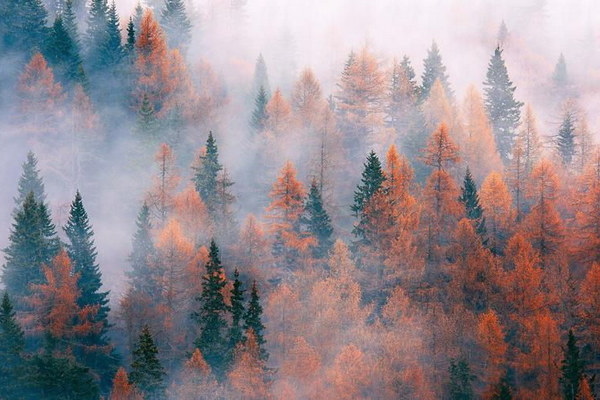Чарльз Маккей. Два соловья
В классическом лесу, в дремучих дебрях
Два соловья, лишь только солнце село,
Наполнили чащобу дивным пеньем –
Всё замерло вокруг и замолчало,
Когда они друг с другом говорили.
Я так устал – прощебетал один –
Ночь напролёт в унылых сучьях петь;
Небесный голос мой никто не слышит
Здесь, в этой захолустной глухомани;
Вон звёзды, вот луна – и что с того?
Вот если бы влюблённые блуждали,
Чтобы послушать голос мой в ночи,
Назвав его прекрасным… У меня
Поклонники достойные бы были,
И, бросив книги, восхищались мной,
И ложь мою ценили б мудрецы,
Признав меня задумчивым поэтом.
Зачем мне тратить голос свой на ветер,
И как тут петь, коль нет пренебреженья
К бесчувственной толпе? Уйду из чащи
В цивилизацию, где голос мой
Услышат люди, красоту оценят
Моих рулад, и станут популярны
Мелодии мои… Брат, улетим?
Нет – отвечал другой – я счастлив здесь,
Мне не нужны аплодисменты мира.
Среди дубов, среди холмов вот этих
Я рыбой себя чувствую в воде,
Оставь меня смотреть на эти звёзды.
Я полон чувств, здесь песню я сложил
И радость испытал от этой песни,
Она награда мне – зачем мне суд
Людей? Их приговор зачем мне знать,
Коль это всё не входит в мои песни?
Моё – петь гимн величию любви,
Которой переполнена душа,
И если люди слушают меня,
То я готов делиться с ними счастьем;
А ежели не слушает никто,
Не менее я буду счастлив петь.
Слабак ты! – свистнул первый – не по мне,
Такая участь – петь в краю убогом.
Что ж, оставайся! На крыле удачи
Лечу к успешным в этом мире людям,
Которые возвысят мое имя,
Так что прощай! – сказал и улетел,
Презрительно насвистывая что-то.
Так, трепыхая крыльями свободы,
Он прилетел в огромный мегаполис,
Проросший башнями и куполами,
Дымящимися трубами. Усевшись
На шпиль, что дотянулся до когда-то
Туманного и солнечного неба,
Он глянул вниз: со всех сторон тянулись,
Пересекались улицы, проезды,
И множество людей по ним сновапо;
Звонки и грохот конных экипажей,
Тележек по булыжной мостовой
Вплетались в громкий рёв гудков фабричных
И в перестук проворных молотков.
Вращались паровых машин колёса,
Ходили поршни ходуном в цилиндрах,
Шипели паром фабрики, заводы…
Всё это не смутило соловья
И, вслушиваясь лишь в себя, запел он
Амбициозную свою печаль.
Он вынужден был петь при свете дня,
Хотя до этого пел только ночью;
Он вынужден был петь, вдыхая дым,
И музыка его мешалась с дымом;
Но он все пел и пел, пока не понял –
Никто его не слушает, все люди
Поглощены погоней за деньгами,
У них нет времени его услышать,
И утомлённый соловей замолк.
Увы! – сказал он с плохо скрытой злобой –
Я упустил момент для своих песен,
Для мира я родился слишком поздно,
Вокруг толпа бесчувственных профанов,
Отвергнувших Поэзию за деньги,
И я один остался в мире этом.
И он, взмахнув крылами, улетел
Обратно в свою глушь, на всех обижен,
И больше песен он своих не пел
И в злобе умер он скоропостижно,
И смерть его никто не пожалел.
Другой певец, что предпочёл петь дома,
В родных дремучих дебрях непролазных,
Обрёл необычайной силы голос,
И сладким делалось дыханье ветра,
Когда он пел, и звёзды зажигались,
И Сам Великий проявлял Свой Лик
Среди листвы иль в зеркале ручья
Любовью и надеждой – так он пел,
Преобразуя скуку захолустья
В весёлый бал в таинственном дворце
Природы. Так, о славе не заботясь,
Он славу приобрёл средь звёзд мерцавших
И благодарность всех, кто его слышал.
Привязанность его к родному дому
Удерживала слушать его песни;
Он ощутил свою причастность Богу…
Студенты, что гуляли этим лесом,
Гораздо больше стали чтить природу.
Оригинал
THE TWO NIGHTINGALES.
AN APOLOGUE FOR POETS.
In the deep quiet of an ancient wood,
Two nightingales, that since the sun had set
Had fill'd the enraptured solitude with song,
Sat silent for awhile, and thus began,
One with the other, interchange of thoughts.
"I'm weary," said the one with weakest voice,
"Of singing all night long to these dull boughs,
With none to listen to my heavenly notes.
What are to me these green insensate woods,
Yon moon and stars, and the unheeding sky?
I would have lovers wander in the shade
At twilight hour, to listen to my voice
And call it beautiful. I would have youths,
Teeming with gentle fancies, quit their books,
And bend a willing ear to my sweet strains:
I would have sages hearken to my lay,
And own me poet of the pensive night.
Why should I waste my music on the winds,
Or how sing on, abandon'd to neglect?
I will away, and force the callous crowd
To be delighted. Through some city vast
My voice shall sound, till busy men shall stop,
And to my floods of swelling melody
Give ear enraptured. Brother, come away!"
"No," said the other — "I am happy here;
To me all needless is the world's applause.
Amid these oaks, surrounded by these hills,
Lull'd by the dash of waters down the rocks,
Look'd on by moon and stars, leave me to sing.
My breast is full — my song an utterance
Of joy, that gives me joy to breathe it forth;
My song its own reward. — Why should I court
The ear of men, or pine in useless grief
That hither comes no audience for my lays
Mine is a hymn of Gratitude and Love,
An overflowing from my inmost heart;
And if men listen and are pleased, not less
My pleasure in administering to theirs.
But if none care to hear my melodies,
Not the less happy would I be to sing."
"Thou poor in spirit !" said the first ; "Not mine
This dull contentment, this ignoble peace, —
To which I leave thee. On adventurous wing
I take my flight to the abodes of men,
And they shall honour and exalt my name: —
So fare thee well !" and as he said, he flew
From his companion, scorning his low mind;
And ere the morning reach' d, on pinions free,
A vast, smoke-mantled, dim metropolis,
"With domes and columns, spires and monuments,
And multitudinous chimneys tall as these,
Towering towards the ever hazy sky;
And here alighting on a house-top, sat,
And look'd about him. Far on every side
Stretch' d the long line of streets and thoroughfares,
Trod by a busy and impatient mass;
Church-bells rang heavily on the morning air,
And chariots rattled o'er the dusty stones.
Loud was the roaring of the multitude,
Loud was the clink of hammers on the ear,
And loud the whirling of incessant wheels,
Pistons and pumps, revolving cylinders,
And ever-hissing steam in factories vast.
But nothing daunted by the hubbub round,
And conscious of some utterance in himself,
The ambitious nightingale began his song.
'Twas a forced effort in the eye of Day,
For bird like him, by Night alone inspired;
But still he sang, and on the smoky air
Ponr'd a full stream of no mean music forth.
Till sunny noon, till lamplit eve, he sang,
But no one listen'd : all men were absorb'd
In the pursuit of pleasure or of gain,
And had no time for melodies like his.
Weary at heart the nightingale became,
And disappointment rankled into hate: —
"Alas!" said he, "the age of song is past!
I'm born too late ! — Merit has no reward; —
The cold, unfeeling, and most grovelling Crowd
Forsakes dear Poesy for love of wealth,
And all forlorn and desolate am I."
So saying, he outstretch'd his wings, and fled
Back to his solitude, and sang no more;
And living voiceless — angry with himself,
And with the world — he died before his time,
And left no mourner to lament his fate.
The other nightingale, more wise than he,
With fuller voice and music more divine,
Stay'd in the woods, and sang but when inspired
By the sweet breathing of the midnight wind —
By the mysterious twinkling of the stars —
By adoration of the Great Supreme —
By Beauty in all hues and forms around —
By Love and Hope, and Gratitude and Joy;
And thus inspired, the atmosphere was rife
With the prolong'd sweet music that he made.
He sought no listeners — heedless of applause —
But sang as the stars shone, from inward light,
A blessing to himself and all who heard.
The cotter, wending weary to his home,
Linger'd full oft to listen to his song,
And felt 'twas beautiful, and bless'd the strain;
And lonely students, wandering in the woods,
Loved nature more because this bird had sung.
Два соловья, лишь только солнце село,
Наполнили чащобу дивным пеньем –
Всё замерло вокруг и замолчало,
Когда они друг с другом говорили.
Я так устал – прощебетал один –
Ночь напролёт в унылых сучьях петь;
Небесный голос мой никто не слышит
Здесь, в этой захолустной глухомани;
Вон звёзды, вот луна – и что с того?
Вот если бы влюблённые блуждали,
Чтобы послушать голос мой в ночи,
Назвав его прекрасным… У меня
Поклонники достойные бы были,
И, бросив книги, восхищались мной,
И ложь мою ценили б мудрецы,
Признав меня задумчивым поэтом.
Зачем мне тратить голос свой на ветер,
И как тут петь, коль нет пренебреженья
К бесчувственной толпе? Уйду из чащи
В цивилизацию, где голос мой
Услышат люди, красоту оценят
Моих рулад, и станут популярны
Мелодии мои… Брат, улетим?
Нет – отвечал другой – я счастлив здесь,
Мне не нужны аплодисменты мира.
Среди дубов, среди холмов вот этих
Я рыбой себя чувствую в воде,
Оставь меня смотреть на эти звёзды.
Я полон чувств, здесь песню я сложил
И радость испытал от этой песни,
Она награда мне – зачем мне суд
Людей? Их приговор зачем мне знать,
Коль это всё не входит в мои песни?
Моё – петь гимн величию любви,
Которой переполнена душа,
И если люди слушают меня,
То я готов делиться с ними счастьем;
А ежели не слушает никто,
Не менее я буду счастлив петь.
Слабак ты! – свистнул первый – не по мне,
Такая участь – петь в краю убогом.
Что ж, оставайся! На крыле удачи
Лечу к успешным в этом мире людям,
Которые возвысят мое имя,
Так что прощай! – сказал и улетел,
Презрительно насвистывая что-то.
Так, трепыхая крыльями свободы,
Он прилетел в огромный мегаполис,
Проросший башнями и куполами,
Дымящимися трубами. Усевшись
На шпиль, что дотянулся до когда-то
Туманного и солнечного неба,
Он глянул вниз: со всех сторон тянулись,
Пересекались улицы, проезды,
И множество людей по ним сновапо;
Звонки и грохот конных экипажей,
Тележек по булыжной мостовой
Вплетались в громкий рёв гудков фабричных
И в перестук проворных молотков.
Вращались паровых машин колёса,
Ходили поршни ходуном в цилиндрах,
Шипели паром фабрики, заводы…
Всё это не смутило соловья
И, вслушиваясь лишь в себя, запел он
Амбициозную свою печаль.
Он вынужден был петь при свете дня,
Хотя до этого пел только ночью;
Он вынужден был петь, вдыхая дым,
И музыка его мешалась с дымом;
Но он все пел и пел, пока не понял –
Никто его не слушает, все люди
Поглощены погоней за деньгами,
У них нет времени его услышать,
И утомлённый соловей замолк.
Увы! – сказал он с плохо скрытой злобой –
Я упустил момент для своих песен,
Для мира я родился слишком поздно,
Вокруг толпа бесчувственных профанов,
Отвергнувших Поэзию за деньги,
И я один остался в мире этом.
И он, взмахнув крылами, улетел
Обратно в свою глушь, на всех обижен,
И больше песен он своих не пел
И в злобе умер он скоропостижно,
И смерть его никто не пожалел.
Другой певец, что предпочёл петь дома,
В родных дремучих дебрях непролазных,
Обрёл необычайной силы голос,
И сладким делалось дыханье ветра,
Когда он пел, и звёзды зажигались,
И Сам Великий проявлял Свой Лик
Среди листвы иль в зеркале ручья
Любовью и надеждой – так он пел,
Преобразуя скуку захолустья
В весёлый бал в таинственном дворце
Природы. Так, о славе не заботясь,
Он славу приобрёл средь звёзд мерцавших
И благодарность всех, кто его слышал.
Привязанность его к родному дому
Удерживала слушать его песни;
Он ощутил свою причастность Богу…
Студенты, что гуляли этим лесом,
Гораздо больше стали чтить природу.
Оригинал
THE TWO NIGHTINGALES.
AN APOLOGUE FOR POETS.
In the deep quiet of an ancient wood,
Two nightingales, that since the sun had set
Had fill'd the enraptured solitude with song,
Sat silent for awhile, and thus began,
One with the other, interchange of thoughts.
"I'm weary," said the one with weakest voice,
"Of singing all night long to these dull boughs,
With none to listen to my heavenly notes.
What are to me these green insensate woods,
Yon moon and stars, and the unheeding sky?
I would have lovers wander in the shade
At twilight hour, to listen to my voice
And call it beautiful. I would have youths,
Teeming with gentle fancies, quit their books,
And bend a willing ear to my sweet strains:
I would have sages hearken to my lay,
And own me poet of the pensive night.
Why should I waste my music on the winds,
Or how sing on, abandon'd to neglect?
I will away, and force the callous crowd
To be delighted. Through some city vast
My voice shall sound, till busy men shall stop,
And to my floods of swelling melody
Give ear enraptured. Brother, come away!"
"No," said the other — "I am happy here;
To me all needless is the world's applause.
Amid these oaks, surrounded by these hills,
Lull'd by the dash of waters down the rocks,
Look'd on by moon and stars, leave me to sing.
My breast is full — my song an utterance
Of joy, that gives me joy to breathe it forth;
My song its own reward. — Why should I court
The ear of men, or pine in useless grief
That hither comes no audience for my lays
Mine is a hymn of Gratitude and Love,
An overflowing from my inmost heart;
And if men listen and are pleased, not less
My pleasure in administering to theirs.
But if none care to hear my melodies,
Not the less happy would I be to sing."
"Thou poor in spirit !" said the first ; "Not mine
This dull contentment, this ignoble peace, —
To which I leave thee. On adventurous wing
I take my flight to the abodes of men,
And they shall honour and exalt my name: —
So fare thee well !" and as he said, he flew
From his companion, scorning his low mind;
And ere the morning reach' d, on pinions free,
A vast, smoke-mantled, dim metropolis,
"With domes and columns, spires and monuments,
And multitudinous chimneys tall as these,
Towering towards the ever hazy sky;
And here alighting on a house-top, sat,
And look'd about him. Far on every side
Stretch' d the long line of streets and thoroughfares,
Trod by a busy and impatient mass;
Church-bells rang heavily on the morning air,
And chariots rattled o'er the dusty stones.
Loud was the roaring of the multitude,
Loud was the clink of hammers on the ear,
And loud the whirling of incessant wheels,
Pistons and pumps, revolving cylinders,
And ever-hissing steam in factories vast.
But nothing daunted by the hubbub round,
And conscious of some utterance in himself,
The ambitious nightingale began his song.
'Twas a forced effort in the eye of Day,
For bird like him, by Night alone inspired;
But still he sang, and on the smoky air
Ponr'd a full stream of no mean music forth.
Till sunny noon, till lamplit eve, he sang,
But no one listen'd : all men were absorb'd
In the pursuit of pleasure or of gain,
And had no time for melodies like his.
Weary at heart the nightingale became,
And disappointment rankled into hate: —
"Alas!" said he, "the age of song is past!
I'm born too late ! — Merit has no reward; —
The cold, unfeeling, and most grovelling Crowd
Forsakes dear Poesy for love of wealth,
And all forlorn and desolate am I."
So saying, he outstretch'd his wings, and fled
Back to his solitude, and sang no more;
And living voiceless — angry with himself,
And with the world — he died before his time,
And left no mourner to lament his fate.
The other nightingale, more wise than he,
With fuller voice and music more divine,
Stay'd in the woods, and sang but when inspired
By the sweet breathing of the midnight wind —
By the mysterious twinkling of the stars —
By adoration of the Great Supreme —
By Beauty in all hues and forms around —
By Love and Hope, and Gratitude and Joy;
And thus inspired, the atmosphere was rife
With the prolong'd sweet music that he made.
He sought no listeners — heedless of applause —
But sang as the stars shone, from inward light,
A blessing to himself and all who heard.
The cotter, wending weary to his home,
Linger'd full oft to listen to his song,
And felt 'twas beautiful, and bless'd the strain;
And lonely students, wandering in the woods,
Loved nature more because this bird had sung.
Метки:









